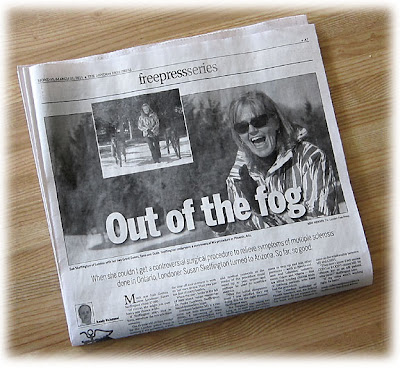 |
| Into the fog might be an apt title for The Free Press series. |
There is a battle raging over information. I am NOT referring to the battle between the Main Stream Media (MSM) and bloggers but the war being waged over how we, the readers, process the information we read in either the MSM or in the blogosphere.
An article, Out of the fog, in The London Free Press is an excellent example. In the old days, I'd have read this article and have either believed it or not. Those were the two choices. But today there is a third choice..
Thanks to the Internet, the moment I read something I question I turn to Google. Depending upon what I learn, I may write a blog post. If I am really offended and want to warn others, I post to Digital Journal. I did this with a story about a St. Catherines man who died in Costa Rica of complications from a controversial multiple sclerosis (MS) treatment (CCSVI).
The London Free Press and reporter Randy Richmond recently seemed to promote CCSVI with an article featuring Paolo Zamboni, the Italian doctor behind the controversial treatment:
"Zamboni believes MS is a vascular, not auto-immune condition. A narrowing of veins -- chronic cerebrospinal venous insufficiency (CCSVI) — is prevalent in MS patients and can be treated by a simple surgical procedure — angioplasty — that widens the veins. The procedure is also known as liberation therapy."
The Free Press article introduced us to a local woman suffering from MS. She found it impossible to have the highly suspect surgical procedure done in Ontario. Richmond tells the reader, "She tried to talk to her neurologist about liberation therapy. He dismissed Zamboni's work."
What Richmond, a Free Press crack investigative reporter, doesn't tell us is "Zamboni himself admits his research lacks scientific rigour: his sample was small; there was no control group. Two studies in the Annals of Neurology have refuted his findings." Source: Macleans.
The following is from the Skepticblog. It is from a post called CCSVI - The Importance of Replication
"We have two independent replications of Zamboni’s research published in the latest issue of the Annals of Neurology – and both are completely negative. The first is a German study by Florian Doepp et al, using ultrasound to test the CCSVI criteria in 56 MS patients and 20 controls. They found almost completely negative results (one MS patient met one criterion, but not the others) – no signs of venous blockage in the MS patients.
The second study is a Swedish study . . . – not yet available online. This study used MRI scanning to assess blood flow in the internal jugular vein in 21 MS patients and 20 controls, and also found no difference."
I am reprinting the last paragraph from the Skepticblog article as author Steven Novella puts it so well:
"I do wish that the media and public would learn the more general lesson here – new dramatic ideas in science, especially those that seem to go against established knowledge, are likely to turn out to be wrong when the dust settles. It is partly the job of the skeptical community to provide cultural memory of such events – so the next time a lone scientist or doctor claims to have made a revolutionary breakthrough that seems a bit dubious, it is the skeptics who will be there to say – remember Zamboni."
As I pointed out in a previous post, when it comes to the Canadian medical system, "One must admit, our system has problems." Out of the Fog was part of a London Free Press series on the shortcomings of our healthcare system. Sadly, this article did little to enlighten anyone and may well have done damage. I've have already stumbled upon links to the Richmond series on American, right-wing, anti-Obamacare, websites. They see the Richmond series as a damning indictment of the Canadian health care system.
____________________________________________________
Addendum:
CBC Radio reported in December, 2017, that Dr. Zamboni concluded the therapy he devised is a "largely ineffective technique; [and] the treatment cannot be recommended in patients with MS."
It turns out the London woman was given excellent advice by her doctors. And they were not alone. Doctors around the world dismissed Zamboni's work. Read: Liberation therapy: the 'wave of complications' breaks in Macleans. Going out of the country for a medical treatment not offered in Canada can be dangerous. There may be very good reasons why a procedure is not offered in Canada. If you want to know more, read this article in the Montreal Gazette.
Or read this article in The Globe and Mail that tells us: there is " . . . a growing body of evidence that suggests that they [patients] are wasting their time and their money – and perhaps putting their lives in danger."
Or read an alert issued by the FDA in the States on potential dangers of unproven treatments for multiple sclerosis.
If you are personally suffering from MS and no hope is offered, it is quite understandable that you might turn to liberation therapy for an answer.
The London woman in the article has stated that the CCSVI therapy she has undergone at her own expense was actually less expensive than the drug therapy being offered. In cases like this, where the person is adamant to have the therapy and the cost is actually a savings to the Canadian medical system, maybe the government should consider covering the costs of out-of-country medical treatment.
This remark, of course, is a little flippant as there are moral issues that must be resolved: Is it ethical to send someone out of the country for highly questionable treatment because the patient wants it and the treatment promises to save the Canadian medical system money?




No comments:
Post a Comment